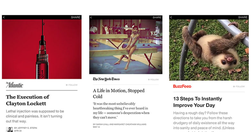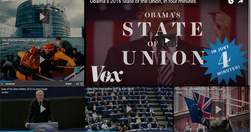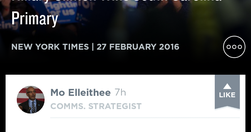
journalists can engage their audiences as contributors, advisors, advocates, collaborators and partners. This study describes in detail how newsrooms and independent journalists can grow their readership, boost their relevance and find new sources of revenue by listening to and learning from their audiences.... This is about how journalists can ge…

As we learn about the ways people use the news, what features might invite their trust and loyalty?... 32 senior strategists, designers, and developers... created prototype tools to surface the Trust Project indicators of quality, a set of fundamental journalistic principles that align with today’s news users wants and needs.

one magic formula after another to save the business of news. Citizen journalism... "Brand You"... Viral headlines... Aggregation, curation, explainer journalism, explainer video, branded content, text bots, video, branded video, branded virtual reality video…each fueling the hope that here, at last, was the way to make news profitable again... n…
the next big thing in news - constructive journalism...not only analysing problems but also exploring potential solutions. It's about trying to examine what's going right in the world - and why - rather than focusing purely on what's going wrong... People don't want more news, they want better news. Constructive journalism provides an alternative.…

The United Nations is to call for the world's media to take a more "constructive" and "solutions-focused" approach to news to combat "apathy and indifference"... the Constructive Voices programme run by the National Council for Voluntary Organisations... an online resource designed to help journalists find case studies that provide practical solut…

Video will not save your media business. Nor will bots, newsletters, a “morning briefing” app, a “lean back” iPad experience, Slack integration, a Snapchat channel, or a great partnership with Twitter. All of these things together might help, but even then, you will not be saved by the magical New Thing that everyone else in the media community is…
thinking of videos as pieces that can stand on their own, not “the way to slightly better monetize an article page"... There’s usually no reason to watch an interview. It’s better in text or as a podcast.... the Vox team works like independent YouTubers.” For any given video, a single person is responsible for the entire production process, from …

Digital media companies are caught in the "crap trap," mass-producing trashy clickbait so they can claim huge audiences and often higher valuations... This era is getting flushed away... A content revolution is picking up speed, promising a profitable future for companies that can lock down loyal audiences, especially those built around higher-qua…

Publications are hiring a point person to coordinate with new platforms like Facebook Instant Articles and Snapchat Discover... product changes of platforms happen on a daily basis. Just to track those changes and newly emerging platforms is a full-time job in itself
the question is not whether the media should be subsidized. It is rather whether they should be granted a favorable legal and tax status in recognition of their contribution to democracy ... it has become imperative to think of new models for the media. The one I propose is based on crowdfunding and power-sharing... Let us call this new entity a …

Last spring, the Financial Times altered its former metered access model and introduced paid trials, letting users pay £1 ($1.42) for a month’s access to content. At the same time, the newspaper also changed its policies toward social platforms and began making more content free to people coming to its site from Google, Facebook and Twitter. It la…

For The Atlantic, sponsored content has proved better ROI than other ad formats. Native advertising is estimated to reach around 75 percent of The Atlantic’s ad revenue this year, up 15 percent from 2015... a spectrum of native ads, from video to infographics to text-based editorial pieces

At The Guardian’s Media Summit in London, those publishers and others discussed what’s working for them with their platform strategies, and how sustainable off-site publishing is likely to be for media companies in the long term... Cosmo’s Snapchat Discover editions get 76 percent completion rates... 56 percent ... coming back to us five days …

EurActiv.com is opening one of its media innovations to other media interested in increasing competitiveness through translated syndication. (Update, 31/3/16: this project was covered, among many other things, in an interview with professional EU interpreter Alexander Drechsel in his podcast Demos ex machina? Multilingual communication with Mathew…

Also called native advertising, sponsored content borrows the look, the name recognition, and even the staff of its host publication to push brand messages on unsuspecting viewers... the line between what’s sponsored and what isn’t—between advertising and journalism—has already been rubbed away. who would bother pitching a story to The Atlantic …

Comments on our own content create real community and offer vital feedback to content creators and consumers both. And thus, we should fight for them to be better. Comments are not just a nice-to-have but a core part of a media site’s mission... Lots of broken comment systems are designed for a platonic ideal of how people ought to behave.... Can …

the Guardian is a great newspaper whose survival should concern us all... Digital revenues, which had been predicted to increase to £100m in the current financial year, are stuck at around £80m, while advertising print revenues have declined by about 20 per cent... Nor could anyone dispute that the Guardian’s website has been highly successful. I…

ProPublica, for example, has always encouraged others to “steal its stories” — which has both increased pageviews and resulted in thousands of sites reprinting their pieces. I see Creative Commons licensing as a smart way to distribute local or national content when the goal is maximum impact... [and] as an important survival tool for smaller an…

News is a product... our news products must be good and targeted to succeed. They must know who their users are, what they need, how they need it, and deliver a satisfying experience. That is what a product manager does... thinking about what users ... need from the whole of that product; what their experience of it is like; how it could be more c…

Email, for all the claims of it being dead, is critical for many publishers as a distribution (and marketing) channel they continue to control... Email newsletters have become an important part of publishers’ audience development strategies as a way to deepen their relationship with readers by providing an antidote to the endless stream of news in…

A short post on the financial costs of not having a European Public Sphere.
The institutional brand building you create by having your journalists be great on social platforms cannot be underestimated. Part of having your journalists on these platforms is giving them the freedom to be a normal human being, not a robot, a PR machine or a slave to the wire.

As newsrooms disappear, veteran reporters are being forced from the profession. That’s bad for journalism—and democracy... In 2007, there were 55,000 full-time journalists at nearly 1,400 daily papers; in 2015, there were 32,900,.. doesn’t include the buyouts and layoffs last fall... what remains of print journalism is shifting, morphing i…
Enter the new editors of the Internet: giant, centralized tech companies that have created platforms... notably Facebook and Apple — want to be the newsstands of tomorrow: the place we go, inside their own ecosystems, to get our news and information... journalism organizations feel they have no alternative but to be part of those ecosystems. This …

Times are tough for Web publishers... The common threats facing the industry have made partnering up with competitors an easier sell. This collaboration has taken many forms...

Despite ... the belief of many publishers that online ad revenue would surely replace offline, the per-view price of a digital ad continues to drop, and ever-more ad dollars are concentrated with Google and Facebook. Now, to boot, there are ad blockers... paywalls as an alternative revenue stream has, other than for a few must-have titles, produce…

My sadly underwhelmed response to @sidewireinc’s gr8 “Today’s Internet is Optimized for Noise”
top 100 stories of the year, ranked ... by the total length of time people spent reading them... We wanted to see what cross-over this list might have with the biggest New York Times stories on Facebook... We recorded 28 stories in both top 100 lists...36 of the top 100 most shared stories were from the editorial and opinion pages, far more than a…

Axel Springer, wary of being overly dependent on third-party platforms for traffic... fighting back by launching its own news aggregator platform... now has around 1,200 publishers on board ... Digiday spoke with Würtenberger, CEO of Upday, about using humans and algorithms for news sourcing, creating a platform for publishers and banning ad block…
